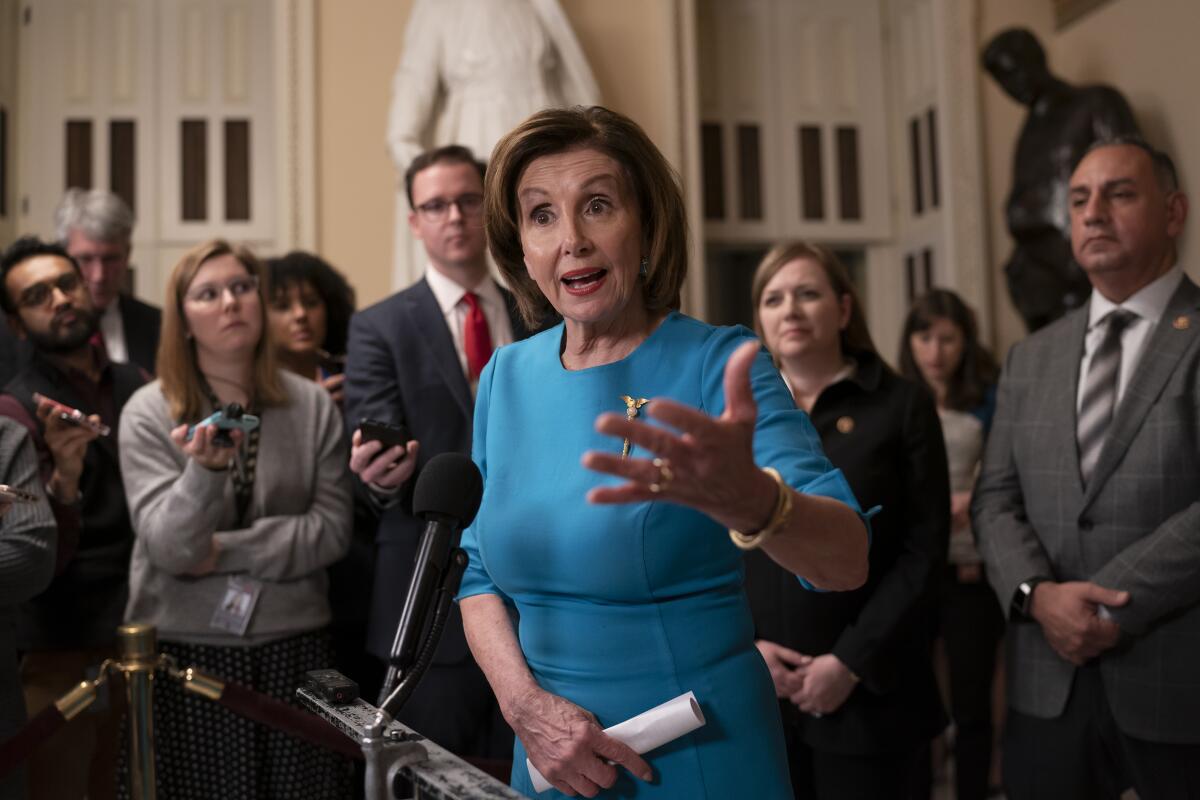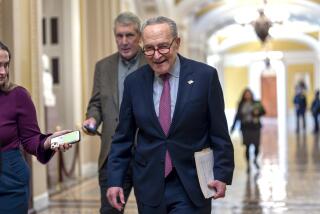Coronavirus stimulus: Pelosi predicts House will pass Senate bill with bipartisan support

- Share via
WASHINGTON — House Speaker Nancy Pelosi says the massive $2.2-trillion coronavirus economic relief bill approved by the Senate will pass the House on Friday with “strong bipartisan support.”
Pelosi spoke to reporters at the Capitol on Thursday a day after the Senate unanimously approved the measure.
The package comes to the House as fresh evidence emerges that the economy is in a recession. The government reported 3.3 million new weekly unemployment claims, four times the previous record.
“We will have a victory tomorrow for America’s workers,” Pelosi said, praising the bill’s expansion of unemployment benefits. She encouraged companies battered by the pandemic to keep paying their workers, even those who are furloughed.
“Tomorrow we’ll bring the bill to the floor,” she told reporters. “It will pass. It will pass with strong bipartisan support.”
Federal Reserve Chairman Jerome Powell said in a TV interview the economy “may well be in a recession.”
The unanimous Senate vote late Wednesday came despite misgivings on both sides about whether it went too far or not far enough and capped days of difficult negotiations as Washington confronted a national challenge unlike any it has faced.
The stimulus package — the largest ever — is designed to pump money directly into Americans’ pockets while also shoring up hospitals, businesses, and state and local governments struggling against the pandemic.
The $2-trillion price tag is equal to more than half of the $3.5 trillion the federal government expects to collect in taxes this year, and is 9% of the nation’s gross domestic product.
“It’s going to take care of people,” President Trump said of the legislation during a news conference Wednesday, vowing to sign the bill immediately when it reaches his desk.
A vote was initially delayed in part by concerns from Sen. Lindsey Graham (R-S.C.) and a handful of Republican senators that laid-off low-wage earners in some states might be able to temporarily collect more from the expanded unemployment insurance in the bill than from their original salaries, creating a disincentive to work.
But Treasury Secretary Steven T. Mnuchin, who took part in five days of tense marathon negotiations between congressional Democrats and Senate Republicans, said most Americans would opt to keep their jobs, adding that the provision was needed to streamline the process of getting aid to workers nationwide.
The sweeping package will affect a broad swath of American society, with some elements potentially lasting longer than the health crisis.
“When there is a crisis of this magnitude, the private sector cannot solve it. Individuals, even with bravery and valor, are not powerful enough to beat it back. Government is the only force large enough to staunch the bleeding and begin healing,” Senate Minority Leader Charles E. Schumer (D-N.Y.) said. “This is a time when the American people need their government.”
Along with providing a onetime direct payout of up to $1,200 for most American adults, the bill includes $500 billion in loans to struggling businesses, $377 billion in loans and grants for small businesses, $150 billion for local, state and tribal governments struggling with a drop in revenue and $130 billion for hospitals.
The package also blocks foreclosures and evictions during the crisis on properties where the federal government backs the mortgage; pauses federal student loan payments for six months and waives the interest; gives states millions of dollars to begin offering voting by mail or early voting; and provides more than $25 billion in new money for food assistance programs like SNAP.
The real test will be whether the House accepts the bill as is. Friday’s vote will be held by a voice vote, House Majority Leader Steny H. Hoyer (D-Md.) announced Wednesday evening. That means representatives scattered across the country don’t have to return to Washington for the vote.
“Members who want to come to the House floor to debate this bill will be able to do so. In addition, we are working to ensure that those who are unable to return to Washington may express their views on this legislation remotely,” he told members.
Both Pelosi (D-San Francisco) and House Minority Leader Kevin McCarthy (R-Bakersfield) said Wednesday that they would support holding a voice vote, which would ensure House members don’t have to return if they don’t want to for health or safety reasons. But if some wanted to object in person, they could.
“I do not believe we should pass a $2-trillion bill by unanimous consent,” McCarthy said.
A voice vote is generally determined by which side is the loudest, as decided by the member presiding over the House at the time. The losing side often asks for a recorded vote, which would require Pelosi to recall House members from across the country.
Several House Democrats were also unhappy with the bill, saying it helps business at the expense of people. Michigan Rep. Rashida Tlaib tweeted that she was angry the Senate bill didn’t help people whose water was shut off for lack of payment during the outbreak.
The onetime payments to Americans will be based on adjusted gross income reported in 2019 taxes — if they have been filed — or 2018 taxes, if they have not. The amount will decline gradually beginning with individuals who made $75,000 or married couples filing jointly who made $150,000. Individuals making $99,000 or above or married couples making $198,000 or more would receive no check. People would receive an additional $500 per child.
Mnuchin said payments could arrive in three weeks for those who had direct deposit set up with the Internal Revenue Service but could take several additional weeks for printed checks. The IRS may also release the payments in the form of debit cards, a Republican aide said.
Even those who have no income, whose income comes entirely from nontaxable benefit programs like Social Security or who file a tax return only to take advantage of the refundable Earned Income Tax Credit and Child Tax Credit, should get a check.
First proposed last week, the bill was delayed by days of negotiations that spurred angry speeches and uncharacteristic outbursts on the Senate floor. Republicans accused Democrats of dragging their feet and trying to squeeze more priorities into the bill while the crisis mounted.
“We should have passed this last Sunday. Time was wasted,” Sen. John Barrasso (R-Wyo.) said.
Senate Majority Leader Mitch McConnell (R-Ky.) said Wednesday he would leave it to others to determine whether Democrats’ changes were worth the delay.
“The Senate is going to stand together, act together, and pass this historic relief package today,” McConnell said. “The Senate will act to help the people of this country weather this storm. This is not even a stimulus package. It is emergency relief.”
Democrats said they won many important changes that made the bill more beneficial to people hit hardest by the coronavirus crisis. “To improve this legislation was worth taking an extra day or two,” Schumer said.
Included in the changes are:
- An expansion of who qualifies for unemployment insurance to include people who were furloughed, gig workers and freelancers. It included an increase in the unemployment payments by $600 per week for four months on top of what states provide as a base unemployment compensation, and extended the benefit to 13 weeks for people already collecting unemployment insurance.
- An additional $150 billion for hospitals, including $100 billion in grants that can be used by nursing homes, hospitals, clinics and other healthcare providers scrambling for medical supplies such as face masks, gloves and ventilators.
- An inspector general to oversee $500 billion in loans the Treasury Department will distribute to industries affected by the pandemic and a new five-person congressional committee to conduct oversight of the federal government’s spending on the COVID-19 response. The original bill left it to the Treasury Department to determine which businesses got loans and allowed it to wait up to six months to disclose where the money went.
- A prohibition on businesses controlled by the president, vice president, members of Congress and heads of executive branch departments receiving loans or investments from the Treasury programs. Their children, spouses and in-laws also cannot benefit.
- $400 million for states to prepare for the 2020 elections, aimed at making it easier for states to move toward voting by mail and early voting. It does not require states to participate and is more than double the $140 million in the original bill.
- $25 million for the John F. Kennedy Center for the Performing Arts in Washington, D.C., which is much closer to the $35 million Democrats asked for than the $1 million in the original Republican proposal.
Times staff writer Sarah D. Wire and the Associated Press contributed to this report.
More to Read
Get the L.A. Times Politics newsletter
Deeply reported insights into legislation, politics and policy from Sacramento, Washington and beyond. In your inbox twice per week.
You may occasionally receive promotional content from the Los Angeles Times.










